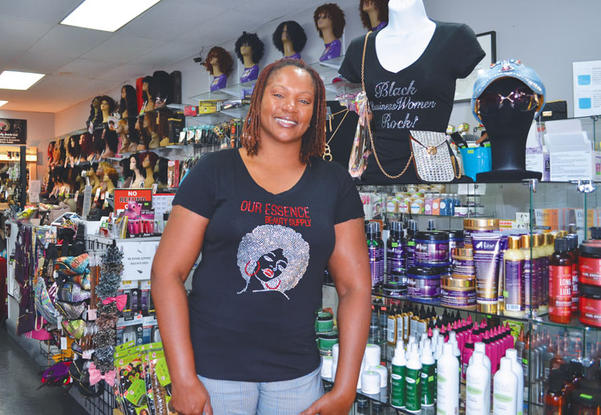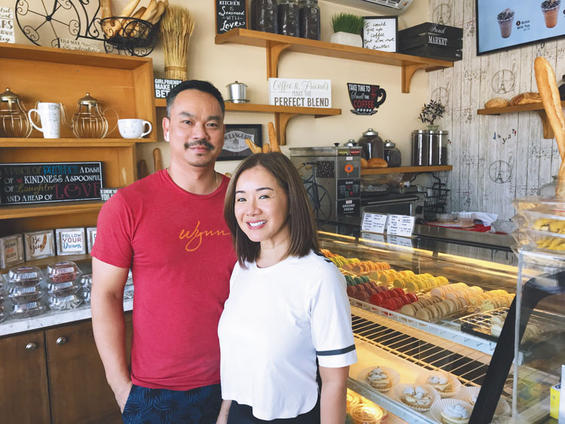Deidre Norville opened Our Essence Beauty Supply, a shop geared toward African Americans, almost two years ago to fill a need in her community. According to Norville, Black women like herself account for a large portion of beauty product consumers, but represent only about 3-4% of the ownership.
Norville is one of several business owners in the city that represent an ethnic minority. According to the leaders of the city’s business improvement districts, the Long Beach Economic Development Department and the Long Beach Small Business Development Center, virtually all entrepreneurs face the same two challenges: obtaining access to capital and developing a business plan. By providing opportunities for funding and education, these local entities are striving to ensure that entrepreneurship is accessible for all.

Deidre Norville is the owner of Our Essence Beauty Supply, a shop that caters to African-American women, located in North Long Beach. She is in the process of raising funds for her business through the Kiva loan program. This allows entrepreneurs to seek out their own lenders through an online crowdfunding platform. A national nonprofit then matches the funds up to $5,000. (Photograph by the Business Journal’s Pat Flynn)
In May, the city partnered with the Los Angeles Local Initiatives Support Corporation to offer the Kiva loan program. Through a microfinance lending platform, this initiative provides access to capital for small business owners who do not qualify for traditional, commercial loans. The program allows aspiring entrepreneurs to raise funds online, while the national nonprofit, Local Initiatives Support Corporation, matches the contributions up to $5,000.
A few weeks ago, Norville, whose business is located in North Long Beach, was approved to start fundraising through Kiva. She plans to use the funds to purchase a new point-of-sale system for tracking inventory (the last one was stolen during a burglary), maintain her current staffing level, and expand her marketing and advertising.
“I’m one of the first to be able to access [the loan],” Norville said. “That’s important because, as more people access it, the guidelines will get more stringent.” Norville’s eventual goal is to franchise her shop. “We want to help other low-income people own beauty supply stores,” she said.
Tasha Hunter, the executive director of the Uptown Business Improvement District (BID), helped guide Norville through the fundraising approval process. In June, the Uptown BID became a Kiva loan trustee, which means they work directly with the borrowers and vouch for them. The BID also connects business owners to city resources and provides free education classes.
“The majority of our businesses in North Long Beach are minority owned. That’s what the population is,” Hunter said. “Even though there’s nothing specifically targeted to them, that’s what my businesses are comprised of.”
The Uptown BID recently finished a workshop series called Business 101, taught by California State University, Fullerton professor Jeff Rowe and Urina Harrell, owner of marketing agency Vox Pop Branding in North Long Beach. Hunter said she is planning another series on financial literacy taught in both English and Spanish.
“We accept people where they are. Some are very knowledgeable in investments and how to manage money, and some need help with just budgeting,” she said. According to Hunter, many of the businesses in her district do not use social media, which makes outreach challenging.
“We still meet them where they are, which requires word of mouth and passing out flyers,” she said. “To have longevity, they’ll have to embrace social media marketing. We’re going to have a lot of big, new developments coming in, and we also have a lot of mom-and-pop shops. How do we project into the future what will help these businesses survive?”
Hunter provides one-on-one help to business owners and said that she is available at any hour on her cell phone. She is trilingual, able to provide services in English, Spanish and Portuguese. Hunter also makes a point to patronize the locally owned stores in her district.
The Downtown Long Beach Alliance (DLBA), another business improvement association that recently became a Kiva trustee, also provides free programs and services to area businesses. The DLBA partnered with the Institute for Innovation & Entrepreneurship at California State University, Long Beach to produce a free business education series. The curriculum, which took place over six weeks, covered the process of developing a business and marketing plan, as well as the basics of accounting and human resources.
“The question came up as to why businesses are closing,” Adam Carrillo, the DLBA’s economic development manager, said. “When you start digging in and identifying what those elements are, it comes down to what they were doing before they signed a lease. As opposed to trying to plug holes in a sinking ship, we wanted to be proactive and put potential business owners through courses that provide the basic tools.”
Carrillo said that, when the series launched last year, more than half of the attendees were women, and, of those, most were ethnic minorities. Through its Woman-Owned Business Accelerator grant program, the DLBA offers up to a total of $10,000 to two women entrepreneurs based in the downtown area. This year’s recipients will be announced on September 13.
Carrillo said another partnership is in the works with Shopify, an e-commerce platform, to launch sessions in expanding online sales. “When you look at who’s successful downtown, they’re successful online, and their retail aspect establishes the brand,” Carrillo said. “So how do we get business owners to utilize e-commerce in a greater capacity? It’s going to be to their benefit if they could sell product 24/7 rather than just when their doors are open.”
Radhika Chougule, the owner of Cuppa Cuppa Artisan Coffee Bar in downtown, is a minority business owner who has taken advantage of the DLBA’s services. Through Carrillo, she was able to take part in the Taste of Downtown Series, where different eateries convene to offer samples of their specialties. Chougule, who is Indian, also applied for the Woman-Owned Business Accelerator.
“It’s always a challenge getting started. Patience is key,” Chougule, who opened two years ago, said. “We faced challenges during the construction phase. The city helped us out because we’re in a historic building. There were additional restrictions that came up. [The city’s] historic team helped us get through the approvals, and answered questions.”

Married couple James Pham and Mai Le are the owners of Baguette De Paris, a café that combines Vietnamese and French cuisine. Located in the Cambodia Town corridor of Long Beach, the city is working on conducting more outreach to immigrant and minority communities about programs to help small businesses. (Photograph by the Business Journal’s Anne Artley)
For Mai Le, the Vietnamese owner of Baguette De Paris, one of the biggest challenges she faced when setting up her shop was the fear that customers would not like her food. “We just do our best,” she said. “I love to cook.” Le immigrated from Saigon when she was 17. “It was hard because English is my second language,” she commented.
But Le’s cuisine, which features a blend of Vietnamese and French food, received a positive reception. “I think this community is great,” she said. “It’s a good adventure. People are very friendly.” Le’s specialty is the banh mi, a Vietnamese-French sandwich made on a baguette with meat, pickled carrots, onions and daikon, a type of root.
Le, whose business is located on Anaheim Street in the midtown area, has not received any help from the city or a BID. Seyed Jalali, an economic development officer for the city, said he has experienced challenges connecting with some immigrant communities about resources for businesses.
“Immigrants have a difficult time asking for help,” Jalali said. “Maybe because of their background or mistrust of the government. It has always been a challenge for us to reach out to those communities. A lot of immigrants, whether they come from Asia or Central America, come from backgrounds where the government is not necessarily on the side of the people or business.”
Jalali has seen some immigrant business owners fall into predatory lending schemes, which he aims to help them avoid. To combat mistrust, the city works with other organizations as an intermediary, such as Centro CHA, a nonprofit that advocates for Latinos, and United Cambodian Community, another nonprofit that supports the advancement of Cambodians. The city also partners with the Small Business Development Center (SBDC), run by Long Beach City College.
“SBDC serves as the first point of contact for our clients to help put a business plan together, fine-tune it, finalize it and get it ready for our client to help present it to a lender,” Jalali said. That’s when it comes to us. We do our own financial analysis, and loans are then reviewed and approved by the sub-committee of the economic development commission.”
SBDC Director Brad Pollak said his organization provides services in two ways: through one-on-one advising and teaching workshops about business fundamentals. According to Pollak, more than 20% of his clients are African-American, more than 10% are Asian and 30% to 35% are Hispanic. All of the SBDC advisors are business owners themselves, and many are fluent in Spanish.
Pollak said minority entrepreneurs are eligible to receive government contracts, as a certain percentage are required to be awarded to minority-owned businesses. This is a process that he helps his clients through. “The biggest challenge businesses face, minority or otherwise, is being clear about their roadmap, and access to capital,” he said. “The main reason we lay down the fundamentals is that, once you have that, then you know how much cash you need. . . . To see somebody start a business, and get that loan or government contract, is extremely satisfying. This of course results in the creation and retention of jobs.”
